The best alternatives to QuickBooks make it simple and easy to manage your accounting with a different software package.

1. Best overall
2. Best free
3. Best for freelancers
4. Best scalable
5. Best for small business
6. Best for ecommerce
7. Best affordable
8. Best with CRM
9. FAQs
10. How we test
QuickBooks enjoys a very high profile, thanks in part to extensive advertising in the media and on TV. However, the best alternatives to QuickBooks accounting software have plenty to offer too including value. Zoho Books, for example, is wonderfully affordable.
If you’re on the lookout for a quality, cloud-based accounting software package QuickBooks initially looks like it fits the bill. But, before you jump in, remember there are other options open to you even though some don't have quite the same advertising budgets in order to promote themselves. They're a little less high profile, but often no less good.
In fact, when it comes to cloud-based accountancy software and tax filing packages too, there are all manner of variations on the theme. We've compared these on several points, from their interface and features to the ease of setup and the learning curve involved. We looked at their pricing plans, what sizes and types of businesses they'd be best suited for, plus their documentation and tutorials. We also evaluated their performance, tools and pricing plans, among other criteria.
Therefore, below we'll list what we think are the best alternatives to QuickBooks.
We've put together a list of the best accounting software for small business.
The best alternatives to QuickBooks accounting software in 2025 in full:
Why you can trust TechRadar
Best overall
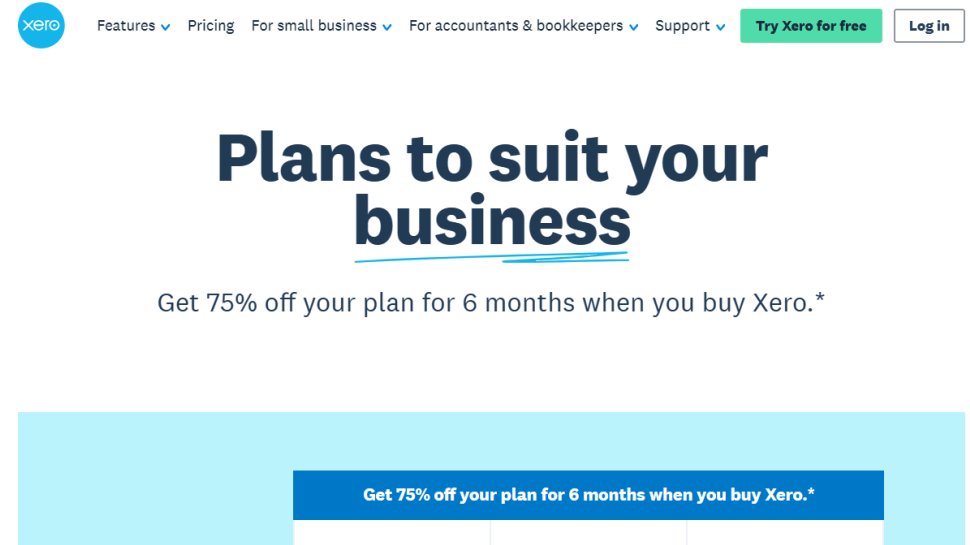
Reasons to buy
Reasons to avoid
So, what to look at if you’re bypassing QuickBooks? Xero is a great place to start as this is an accountancy software package that boasts similar features and functionality, but is more affordable. That’s mainly because it doesn't charge you based on the number of users it has.
Therefore, if you’ve got staff that need to access an accounts package this works out as a good alternative. Equally, the Xero Early package is ideally suited to very small businesses, so there’s a package to suit all.
Xero is a scalable software option and runs pretty smoothly as long as you're connected to the internet and using a swift web browser. Xero even performs well on Android and iOS devices, and the overall experience of using it on a smartphone or tablet is great.
Read our full Xero review.
Best free
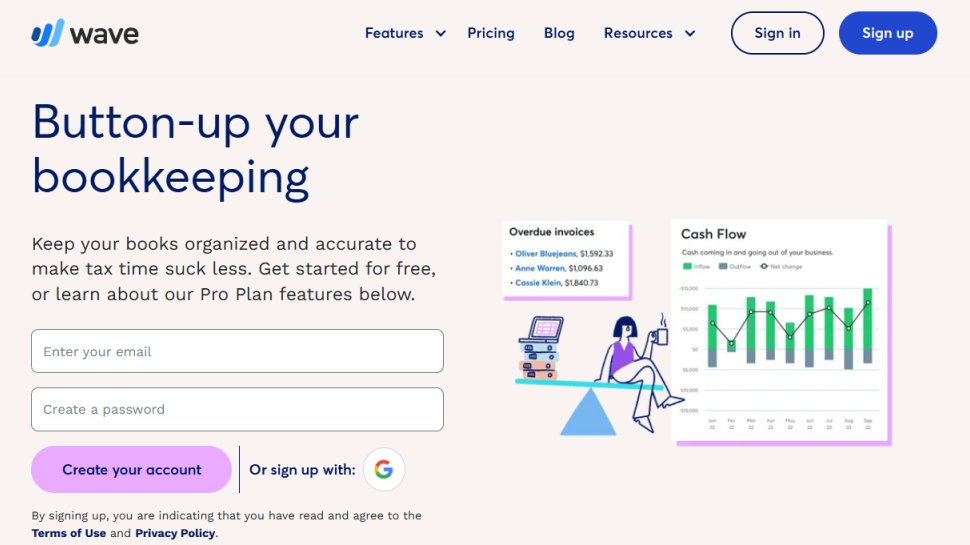
Reasons to buy
Reasons to avoid
Next up, Wave is an ideal option if you’re looking to do things on the cheap. It delivers a great user experience and sports loads of the same features found in the premium-level QuickBooks. It’s aimed at everyone from freelancers and sole traders through to small businesses and those seeking to scale up their work.
Best of all though, Wave is free, and for that you also get the benefit of being able to add in multiple users. Considering you can get it for nothing this is a pretty impressive solution for anyone needing to tackle everyday accounts on a budget.
Wave's interface for the laptop browser and phone apps (iOS and Android) is slick
and works smoothly. There's a solid payroll feature too, but it can currently be used by US and Canadian users only.
Read our full Wave review.
Best for freelancers
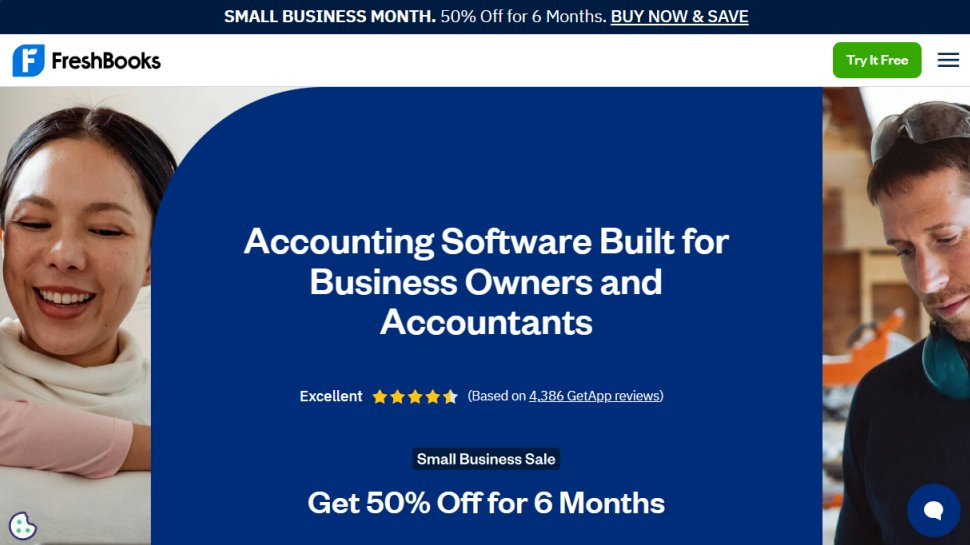
Reasons to buy
Reasons to avoid
If you’re a freelancer, then chances are your needs will be a little more straightforward than a small business that has employees. Therefore, FreshBooks is a solid bet. This is an easy to use program that has a wealth of great tools built-in.
Pricing is very competitive and there are versions to suit all pockets. Pay a little more and the features and functionality increase to match, but even in its most basic guise, FreshBooks is a winner. The try-free option is quite convenient because it lets you explore the package and cancel within 30 days if it’s not suitable for your needs.
In the UK, Freshbooks has collaborated with Barclays to provide joint bookkeeping solutions for customers, offering new ways to help with invoicing and wider business management tasks.
Read our full FreshBooks review.
Best scalable
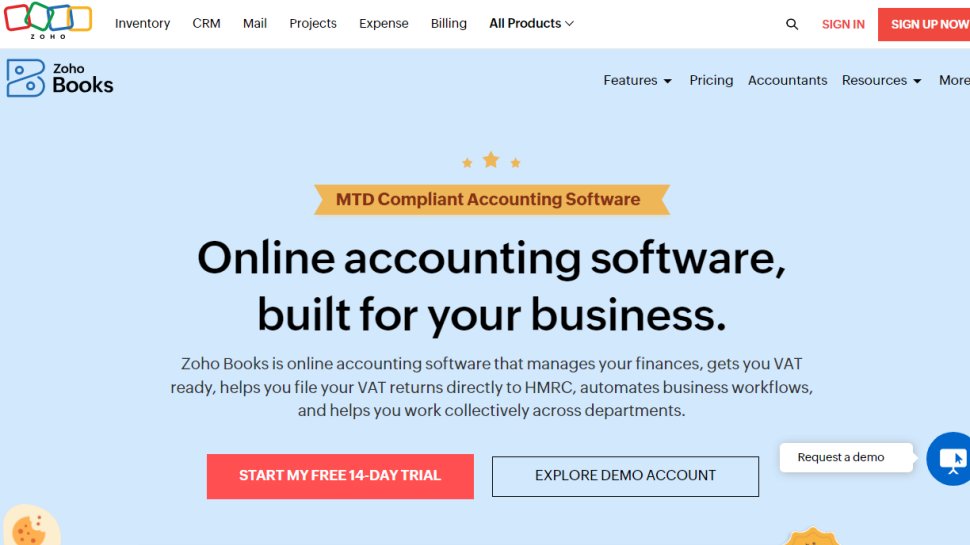
Reasons to buy
Reasons to avoid
The popular Zoho Books is just one product in a whole portfolio of software tools from this publishing house. The benefit of that is you can get Zoho Books to work in unison with other software in the range. That means it is fairly easy to ‘plug in’ expense accounting, billing and invoicing functionality into your standard accountancy tasks.
If you are running a multi faceted business with quite a lot of complex chores to complete , then Zoho Books is well worth looking into. It is quite scalable and offers beefier versions for users with larger business concerns, or anyone intent on expanding their operations. It comes in a range of affordable options too.
Along with the desktop app, Zoho Books' mobile apps are also pretty robust. But the real added value is that it's so easy to integrate Zoho Books with many of the other 55+ Zoho software packages.
Read our full Zoho Books review.
Best for small business
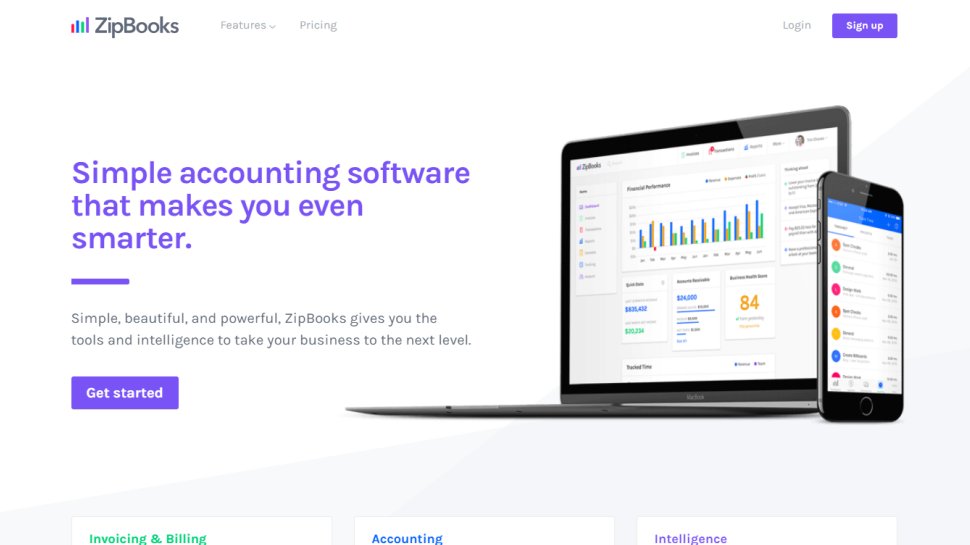
Reasons to buy
Reasons to avoid
Not everyone enjoys tackling their bookkeeping and accountancy duties, so if you’re running a small business and fall into that category, then ZipBooks is worthy of investigation. This is a robust alternative to QuickBooks and comes with a weighty collection of features and functions.
ZipBooks' basic format revolves around four key areas: accounting, billing, expenses, and intelligence. The secret to the last feature is a powerful collection of reporting tools that offer practical and relevant insights into your financial affairs.
The added bonus with ZipBooks is that you can opt to pay for handing everything over to a qualified bookkeeper instead. There is also the provision to mix your own efforts with the help of an advisor, with prices to match.
The basic plan is free and lets you send unlimited invoices, manage unlimited vendors and customers, and check basic reports and supporting connections to one bank.
Read our ZipBooks review.
Best for ecommerce
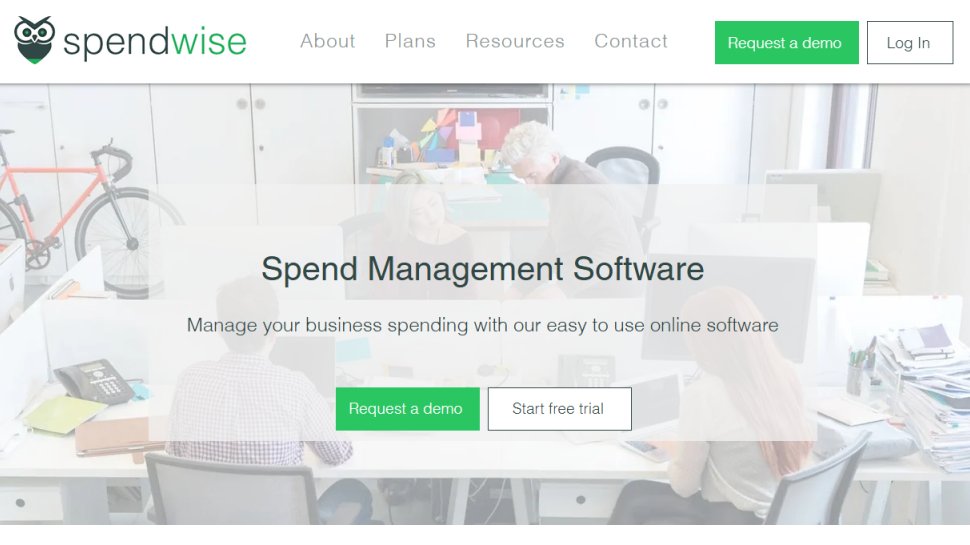
Reasons to buy
Reasons to avoid
If you’re a business that specialises in selling products rather than services, you’ll want to check out Spendwise. This is a very practical solution that delivers lots of tools for managing inventory and tracking any type of product range.
While you’ll need to buy into the more advanced package to enjoy better accountancy-focused features, Spendwise is a powerful option. Product-focused businesses of any size might find this one a good alternative.
The software boasts multiple core features to maximize time and money, with tools for creating multiple purchase orders, managing budgets, and keeping track of bills and expenses. Spendwise can be set up for multiple users and the reporting functionality is quite powerful too.
Packages are attractive for smaller ventures, but with plenty of punch for businesses looking to scale up their operations.
Read our full Spendwise review.
Best affordable
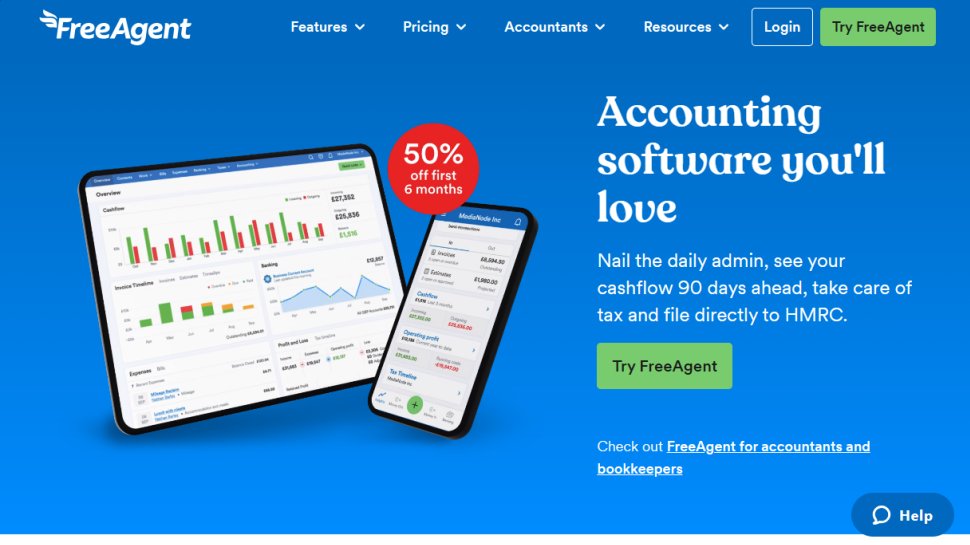
Reasons to buy
Reasons to avoid
The appeal of FreeAgent is mainly due to its affordability factor, with a range of accounting tools on offer for just a few dollars a month. However, there are some limitations although it does possess a raft of cloud-based software essentials, including the ability to manage projects, send invoices, keep track of time as well as staying on top of your accounting tasks too.
If you’ve got pretty standard requirements and want an easy-to-use solution that won't break the bank then FreeAgent is another accountancy package that merits further investigation.
FreeAgent only offers a single tier, making the choice of this accounting solution a more simple ‘all or nothing’ choice that starts with a free 30-day trial. From there, new users get a generous 50% discount for the first 6 months, and then it goes to full price.
Read our FreeAgent review.
Best with CRM
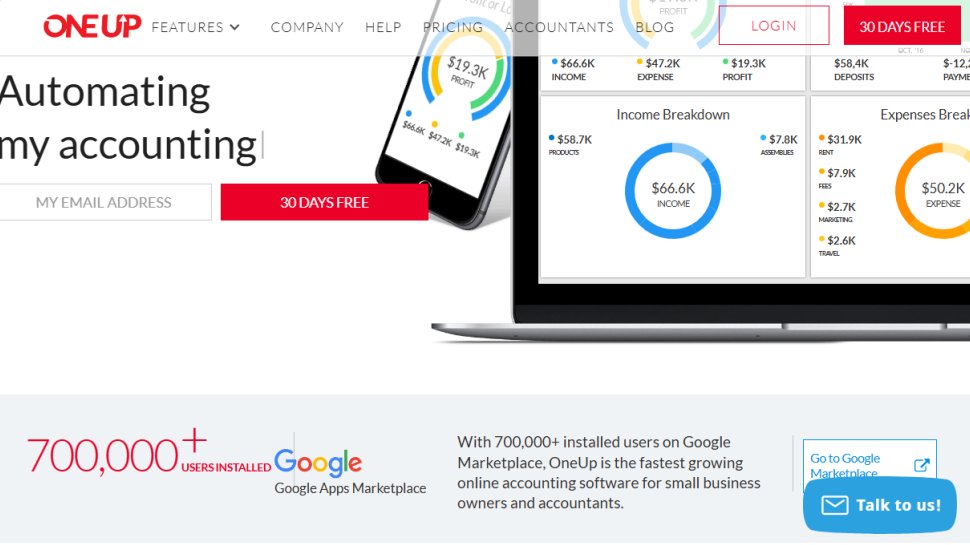
Reasons to buy
Reasons to avoid
The simplicity of accounting package OneUp makes a lot of sense if you’re after a straightforward solution. This isn’t just an accounting package either, because while you can do your bookkeeping with OneUp, the software is also able to assist you with invoicing, inventory management, and also CRM needs.
OneUp does boast a power-packed feature set, but it can also be quite complicated to use. Meanwhile, pricing comes in a tier-based arrangement and there’s a 30-day free trial too, so you can see for yourself just how it ticks.
All the different tools in OneUp were easy to configure, and populating templates for invoicing and inventory orders feels effortless. Overall, OneUp runs smoothly and efficiently thanks to its basic interface, but a weak spot would be the limited third-party integration it offers.
Read our full OneUp review.
Summing up
As you can see from our selection, there are quite a few options if you're looking for an alternative to using QuickBooks. While many people love QuickBooks, and it’s easy to see the appeal of this cloud-based software package, the other selections we’ve highlighted here might be more useful for more specific needs.
As is frequently the case, many accountancy packages come with the benefit of a free trial, so dip into our best accounting software guides and reviews and, perhaps, check them out for yourself.
Also take a look at our roundup of the best tax software for small businesses.
FAQs
How to choose the best alternatives to QuickBooks accounting software for you?
When selecting the best alternatives to QuickBooks accounting software for you, start with considering your budget, the size and nature of your business, and the essential features you need on your accounting software.
If you're on a tight budget and need only basic accounting features, then free tools will suit you. But if you can invest in accounting software and have more complex requirements, then paid software services are a more efficient option.
Keep in mind that some accounting software are better for product-focused businesses and they'll have tools that'll help these businesses with managing inventory and tracking products.
Also, look out for the ease of setup, the learning curve, user interface, third-party integration, and quality of customer support.
How we test
We tested the best alternatives to QuickBooks accounting software across numerous points, like their interface, learning curve, features, and pricing plans.
We checked how easy it was to set up the different software and how simple the interface was to get started with. We looked at the documentation available and whether the software had a comprehensive knowledge base/FAQ section.
We evaluated what software were suited for the different business sizes and types. We assessed whether they had extra features like inventory management, product tracking, payroll, invoicing, etc.
We also looked at their pricing plans, third-party integrations, and the quality of their customer support, among other aspects.
Read more on how we test, rate, and review products on TechRadar.
Get in touch
- Want to find out about commercial or marketing opportunities? Click here
- Out of date info, errors, complaints or broken links? Give us a nudge
- Got a suggestion for a product or service provider? Message us directly
Also check out the best bookkeeping software.
- You've reached the end of the page. Jump back up to the top ^
Are you a pro? Subscribe to our newsletter
Sign up to the TechRadar Pro newsletter to get all the top news, opinion, features and guidance your business needs to succeed!
Rob Clymo has been a tech journalist for more years than he can actually remember, having started out in the wacky world of print magazines before discovering the power of the internet. Since he's been all-digital he has run the Innovation channel during a few years at Microsoft as well as turning out regular news, reviews, features and other content for the likes of TechRadar, TechRadar Pro, Tom's Guide, Fit&Well, Gizmodo, Shortlist, Automotive Interiors World, Automotive Testing Technology International, Future of Transportation and Electric & Hybrid Vehicle Technology International. In the rare moments he's not working he's usually out and about on one of numerous e-bikes in his collection.
